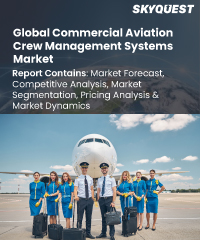
Product ID: SQMIG20A2184

Report ID:
SQMIG20A2184 |
Region:
Global |
Published Date: March, 2024
Pages:
202
|
Tables:
67 |
Figures:
73
The global Commercial Aviation Crew Management Systems Market is analyzed based on its regional presence, which includes North America, Europe, Asia Pacific, Middle East and Africa, and Latin America. In the global commercial aviation crew management systems market, North America emerges as the dominant region. This dominance can be attributed to the presence of major airlines, a technologically advanced aviation sector, and a high degree of focus on operational efficiency and safety. The well-established aviation infrastructure and the continuous integration of advanced technologies in crew management systems contribute to North America's leadership position in this market.
On the other hand, the Asia-Pacific region stands out as the fastest-growing market for commercial aviation crew management systems. The region's burgeoning aviation industry, expanding fleet sizes, and increasing air travel demand are driving the adoption of advanced crew management solutions. Rapidly growing economies, such as China and India, along with the emergence of new low-cost carriers, are propelling the need for efficient crew management systems to optimize scheduling, training, and crew assignments. The Asia-Pacific region's dynamic growth trajectory positions it as a key market for the continued expansion of commercial aviation crew management systems.
Our industry expert will work with you to provide you with customized data in a short amount of time.
REQUEST FREE CUSTOMIZATIONWant to customize this report? This report can be personalized according to your needs. Our analysts and industry experts will work directly with you to understand your requirements and provide you with customized data in a short amount of time. We offer $1000 worth of FREE customization at the time of purchase.

Product ID: SQMIG20A2184